
Terry-Thomas: The Ibiza years
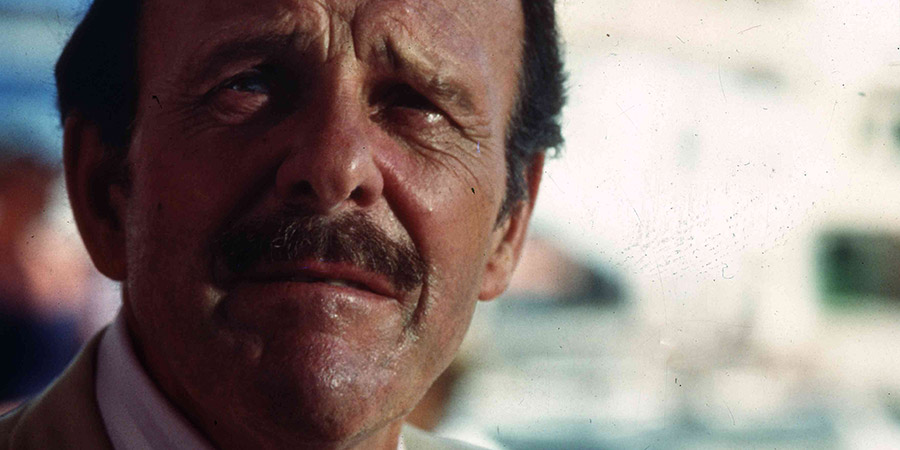
Now that we are deep into Ibiza season, even though this year we are not deep into Ibiza, it seems an appropriate moment to remember one of the island's most celebrated residents: Terry-Thomas. From the late sixties to the early eighties, this most English of characters was happy to make the place his home, and he took Ibiza into his heart.
There had been a number of factors that combined to make him consider moving over to Ibiza from London. One of them was the fact that, as much as he loved England (he always insisted on having the Union Flag flying high above his temporary foreign abodes), he had grown rather tired of its stuffy and class-bound establishment (particularly after 'the blighters' had blackballed him from a couple of gentlemen's clubs). Naturally averse to authority, he had clashed with the powers-that-be on countless occasions (sometimes ending up, struggling to seem contrite, in court), and was so piqued by police pomposity that he frequently took to firing ping-pong balls at them via a toy machine gun secreted inside his car. Too much of a traditionalist to hitch a ride on the home-grown hippie movement, he was looking elsewhere for some kind of an escape, and was just itching for some freedom for fun.
A second factor was that, as cultural fashions changed and new, more demotic, themes came in, it felt to him as though the British film industry was forcing him out into the rest of the world. 'It's no good hawking my English image around England,' he said. 'It's full of Englishmen. My market is everywhere else on the globe. Englishism is an export job.'
A third factor was that, as a consequence, he had started travelling more widely around the world in search of suitable work, pursuing projects in most parts of Europe as well as Borehamwood and Hollywood, and the exposure to different climates and cultures had kindled his curiosity. He rather liked the idea of residing where he might otherwise have merely vacationed, and he also noted that - being 'a bronchial person' - his health had improved considerably since he had been obliged to spend so much more of his time in warmer climes. It thus struck him that it would make sense to find a house in a part of the world where he would not only be nearer to some of the relevant movie studios, but would also no longer be 'working sixteen hours a day [just] to keep myself in throat pastilles'.
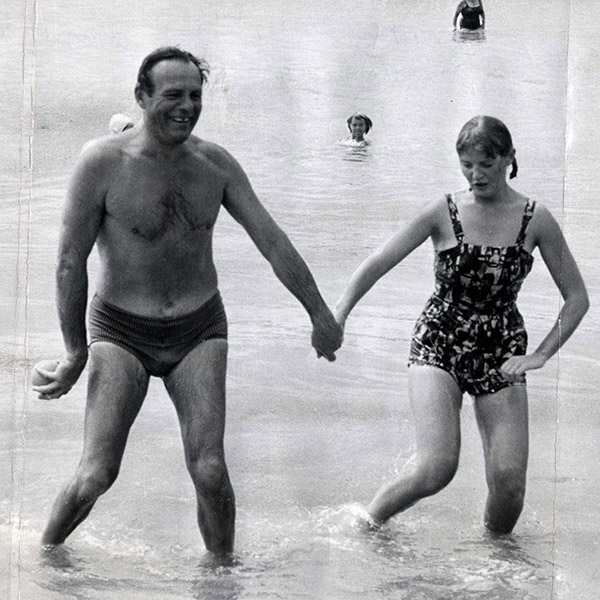
Another factor was that he had, by this stage, not only a new wife (Belinda, twenty-six years his junior, whom he had married in 1963) but also a young child (Timothy, born the following year, who was known affectionately as Tiger), and the prospect of taking his family somewhere warmer, more relaxed and more private was very appealing. While determined to remain a British citizen ('I'm not dodging tax like all these blighters running off to Guatemala and other ridiculous places,' he told reporters. 'I don't think their attitude is at all right'), he fancied creating his own bespoke foreign family base.
The final factor was that an 'English contingent' was already in the process of being put in place at various bases on the Balearic Islands. Late in 1967, he met his fellow actor and long-time friend Denholm Elliott in Los Angeles and, as they drank and socialised, the pair talked about Elliott's new villa in the hills of Santa Eulària des Riu on Ibiza. That casual dialogue, however, soon became an hypnotic monologue.
Elliott, clearly enchanted by the place, rhapsodised about the clouds that covered the island each spring with warm blankets of pink and white almond blossom; spoke fondly of the proud old toothpaste-white farmhouses that nestled on warm red terraces framed by twisted green-grey olive trees and bushy bunches of translucent emerald figs; described how stunningly beautiful the nearby meadows could look when they were full of clumps of purple comfrey, deep-blue borage, blood-red poppies, scarlet and blue pimpernel, white and pale-yellow marguerites and firm young trees of golden-globed fennel; enthused about the simple but delicious tapas, tortilla and spicy albondigas to be eaten and the heady Hierbas liqueurs to be drunk, and, with an especially dreamy look in his eyes, reflected on how wonderfully relaxing it was to sit outside under the warm and dark night sky, sipping good wine, comforted by the distant thrumming of thousands of cicadas.
He also explained about what a rich, relaxed and friendly atmosphere was generated by all of the amiable old ex-pats, visiting actors and artists, colourful Ibizencos and assorted local oddballs who congregated from noon onwards each day at the drinking hole called El Caballo Negro but much better known to its core clientele as 'Sandy's Bar' (run by a tall, fair-haired, fine-featured, quietly-spoken, very well-read and extremely diplomatic Irishman named Sandy Pratt, who not only mixed a mean Bloody Mary but also allowed his regular customers - described by one local as a ragbag of 'painters, wharf rats, beatniks, slackers, raconteurs, jongleurs and elegant Spaniards' - to use the location of his bar as their mailing address).
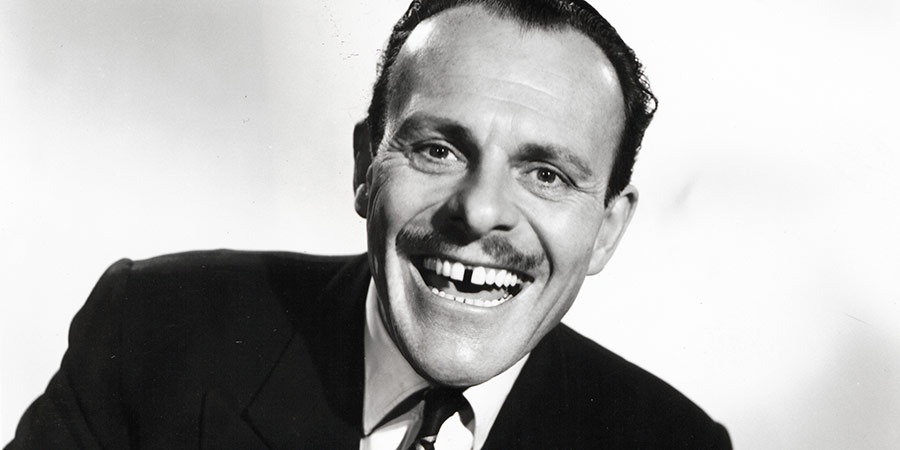
T-T was hugely intrigued: although he had been to the island, briefly, once before, he had left without catching so much as a glimpse of the sun-kissed Mediterranean paradise with which his friend was now so obviously besotted. 'My first impression when I had got off the boat for a quick walk-around Ibiza town,' he recalled, 'was, true, there were lots of pretty girls about, but the streets stank,' and, as he had always made clear, 'muck, dust, grease and unpleasant smells all worry me to the point of distraction'.
Much had changed since then, Elliott assured him, adding that there was a much more attractive and authentic part of Ibiza to explore once one had ventured beyond the touristy towns and stepped into the still-untainted countryside. T-T agreed to see for himself, and so, at the start of March 1968, he and Belinda set off for the island en route to a television show he was due to make in Monaco with Princess Grace.
Sure enough, the couple fell in love with Ibiza soon after they arrived. Gone, it seemed, was 'the dreadfully smelly' land full of 'contrived people' with 'lank hair' and 'tatty Bohemian clothes': in its place, just as Denholm Elliott had promised, was a warmly inviting and largely unspoilt little world for the two of them to embrace, and they proceeded to do so with great pleasure. 'This time,' T-T would declare, 'I was mad about the sparkling Spanish island.'
The history, the climate and the simple and authentic charm of the place held an immediate appeal. There were few paved roads in the area in those days as most of the locals still relied on mules and carts to move about, and the countryside was breathtakingly beautiful. It was also an incredibly cheap place to live: a good evening meal, with a glass of decent wine, at the best local restaurants cost no more then than the equivalent today of fifty pence, and £250 would keep a family comfortable for a whole year. On every level, therefore, T-T was well and truly seduced.
After searching for quite a while, however, neither he nor Belinda had yet found an available villa about which both of them were keen enough to go ahead and attempt to buy. Their unusually long and optimistic list of specifications - which included a good access road, mains water, electricity and a telephone connection, as well as 'a wonderful view' - met with much scratching of heads and shrugging of shoulders in an area of Ibiza that in those days was still relatively primitive, so they decided eventually to do what the Elliotts had done and build a custom-made home of their own.
This led to a different kind of problem: once some of the locals discovered that the millionaire English movie star Terry-Thomas was in the market to buy some land, the prices duly rocketed. He turned down one pleasant but unexceptional plot, for example, when he was told that the price would be £32,000 (which was getting on for £560,000 by today's prices), but then, soon after, he found out that it had been sold to someone else for a mere £8,000 (nearer to £140,000 now). He thus went promptly on his guard, and, as a result, the whole process took far longer than either he or Belinda had envisaged.
Eventually, however, when out horse riding together one day in the countryside, they came across the right place on the north-eastern side of the island: half a hillside by the village of San Carlos in Santa Eulària, six hundred feet above sea level at its lowest point, with a breath-taking panoramic view stretching out across pine, olive, fig, carob and almond trees to a distant bay at Cala Mastella - and the right price (under £20,000) - and they thus secured the basis of their home in the sun. All that they had to do now was to build it.
The only thing that passed for accommodation when they bought the forty acres of land was a run-down hilltop finca (a small farmhouse), but the couple felt, none the less, that their new property had plenty of the necessary potential. 'This is pliable,' said the star, his bright eyes darting from place to place. 'Yes, it's eminently pliable...'
As T-T had always been 'allergic' to architects, he decided, rather boldly, to design the house himself. He knew that, as he had several new movie projects looming on the horizon, he would have to supervise the building - and the builders - while shuttling back and forth between Ibiza and various studios and sets in Hollywood, Pinewood, New York, Paris, Rome and Capri, but he was determined to see that his plans were properly realised.
After moving with his wife and child into a temporary 'operational base' nearby - it was actually an elegant little single-storey villa (Casa Cala Pada) that he was renting from the writer and 'jolly good egg' Robin Maugham - he proceeded in a typically unconventional manner by moulding the shape of his dream home with a large lump of flour-and-water dough. His team of builders then had to refer to the resulting bread maquette until it became more or less completely masked with mildew, after which they resorted to a papier-mâché replacement throughout the remainder of the construction period.
The aim was to create something that would seem broadly in keeping with the traditional Ibicencan style, with dark wooden floors, big open fireplaces, large arched windows, exposed beams and thick, cream-coloured stone walls with soft rounded edges - but with a few distinctive T-T touches. Belinda stored any additional little details, gleaned from sight-seeing trips and conversations with locals, in a scrapbook with a view to incorporating one or two of them at a later date.

T-T was also quick to act on any tips from friends and colleagues, as Georgina Cookson - his co-star in The Naked Truth and now a fellow Ibiza resident - would recall: 'He did the most extraordinary thing. He couldn't decide what colour tiles to have in his pool, and somebody told him that the most wonderful green ones were in the ladies' lavatory at Palma airport. So he flew to Palma and went into the ladies' lavatory...and didn't like them!'
The 'basic' design, once it was finally drafted, accommodated thirty rooms - including no fewer than five kitchens ('kitchens were very useful things to have about the place,' reasoned T-T), several capacious leisure areas (whose walls were to be adorned with bright and colourful murals) and one large circular dining room (with a giant plastic sunflower attached to its ceiling) - as well as a swimming pool, a tennis court, a 'trampoline area' and a separate, two-bedroomed, red stone guest-house that was situated nearby.
Predictably, however, little progress was made whenever the amateur architect was away, as by this time Belinda was pregnant with their second child and the builders - for whom the phrase mañana was proving to be all-too addictive - were often left largely unsupervised. It turned out to be a blessing in disguise, therefore, when the star was forced to take a short unscheduled break from making movies after doing 'all sorts of unspeakable damage' to himself while attempting to water-ski around the bay.
Under his personal supervision, more progress was made. Most of the time it was calm and methodical, but, perhaps inevitably, there was the odd burst of T-T spontaneity. One such occasion saw him react to his own undecidedness about the most desirable shape for a pool by planting several sticks of dynamite into the ground, standing back and blowing it up, and then moving ahead, once the smoke and soil had subsided, with whatever kind of crater that the explosion had created. One way or another, therefore, the project ploughed on.
By the autumn of 1968, the dream house - which ended up costing £100,000 (about £1.75 million by today's money) to create - had become, more or less, a reality, and Belinda had given birth to their second son. The new house acquired the title of Can Talaias, and the couple christened their new baby with the distinctly unusual name of Trumper (because, as Terry-Thomas tried his best to explain, the dictionary definition of 'a "trump" is "a courageous person of exceptional generosity; an excellent fellow"') - although, after their elder son Tiger declared that the plump little baby in his mother's arms looked 'just like a cushion,' the family would never again call Trumper by any name other than that of 'Cushan'.
What followed, once T-T, Belinda, Tiger and baby Cushan had settled into their new Ibicencan home, was a period of happy relaxation interrupted occasionally by some starry private parties ('When we have parties,' he would boast, 'we really have parties'). Ibiza had not yet become the strobe-lit trance and dance centre for which it would later acquire notoriety, but it was already considered a popular fleshpot for the more arty and unconventional members of Britain's show business set (styled by some there as 'the Raj on the Med'), and the Terry-Thomases would share countless sun-drugged leisure hours with the likes of Denholm and Susan Elliott; Jon and Ingeborg Pertwee; Maggie Smith and Robert Stephens; Georgina Cookson and her businessman husband Derek Mitchell; Robin Maugham and his various boyfriends; Leslie Phillips and Caroline Barrett; Laurence Olivier and Joan Plowright; Diana Rigg and her partner of the time David Warner; Maria Aitken and her husband of the time Nigel Davenport; [p=10589]John[//p] and Mary Mills; Annie Ross; Charles Kay; John Hurt; Irma Kurtz; Caroline Mortimer; Richard Todd; Ronald Fraser; Terence Stamp; American actors Farley Granger and Sal Mineo; German singer and model Nico; Swiss movie star Ursula Andress and her on-off escort Jean-Paul Belmondo; the Baron and Baroness van Pallandt (the Danish pop-singing duo better known to the public at the time as Nina and Frederik); and, every now and again, bits of The Beatles and pieces of The Rolling Stones.
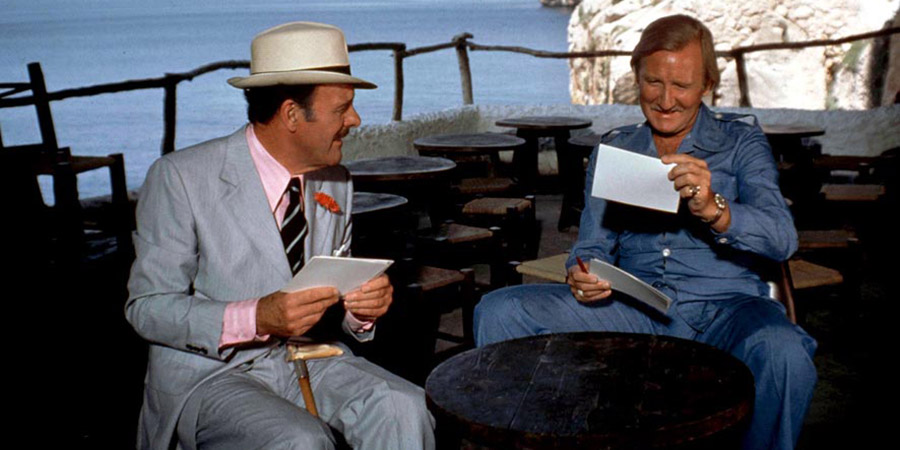
They would also get to know such colourful local characters as the infamous Hungarian art forger and flamboyantly camp figure Elmyr de Hory, the American novelist and faux Howard Hughes biographer Clifford Irving, and the pioneering sex-change model and chic London socialite April Ashley. T-T would also befriend - or be befriended by - a remarkably enigmatic young Dutchman called 'Lord' Sydney Ling - a precocious self-mythologiser who was already claiming, when still a teenager, to be a much-admired film-maker, actor, author, director, producer, promoter, song-writer, flamenco musician, cordon bleu chef, financial consultant, 'PR wizard', PE teacher, confidant of Orson Welles and Salvador Dali and also a regular rescuer of street dogs.
Arguably no one there was better-disposed to appreciate such artful and sometimes mischievous malleability than T-T himself, because, after all, he was more of an expert than any of them in personal revision and reinvention. He had once been the middle class Thomas Terry Hoar Stevens from unfashionable Finchley, seemingly destined for decades of drudgery selling meat in a butchery business, but, by sheer force of will, he had reimagined himself as Terry-Thomas, the classy but classless bounder with the bowler hat on his head and the clove carnation in his buttonhole, changed his accent from humdrum suburban London to turbo-boosted Wodehousian, and grinned his gap-toothed grin until large parts of the world believed that this colourful and confident dandy embodied England down to a T-T. The result was that he could 'read' all of these exotic new neighbours remarkably well.
He knew all about the desire to dream Gatsbyian dreams and write roles to suit new and more appealing scripts. He could see that, in that sense, Ibiza was a bit like America used to think itself to be, a land where old skins could be shed and new paths pursued. It was tolerant, it was diverse, it was discreet and, best of all in his eyes, it was wonderful fun.
Someone always seemed to be getting up to something, or getting over something, or someone, in that part of the island. Plenty of pot was puffed, innumerable drinks were downed, the odd pair of lovers swapped partners and Diana Rigg was renowned for going au naturel whenever she went out and about in her garden ('she rarely put anything on for my benefit,' said Terry-Thomas uncomplainingly, after admitting that he often made a point of passing by just to check).
Sandy's Bar guaranteed everyone some good old Celtic craic (which was monitored discreetly but highly reliably by the ever-popular Mr Pratt), and on the hillside above Cala Llonga. Major Christopher 'Cuth' Adami's restaurant 'The Wild Asparagus' provided them with a more formal and very English alternative (with notable events associated with the House of Windsor always marked by telegrams to Buckingham Palace, loyal toasts and the playing of the national anthem), but more intimate forms of fun - and far more curious kinds of crises - tended to take place in and around the various private villas that were scattered about nearby.
On one typically sunny afternoon, for example, Terry-Thomas was startled when he spotted a nun with 'substantial hands' lounging on Denholm Elliott's roof with a chilled pint of beer - she turned out to be April Ashley in fancy dress, recovering from acting as hostess at the latest of Robin Maugham's exclusive 'drinky' lunches. Denholm Elliott himself was by no means unfamiliar with the experience of intoxication, and once drove the Oliviers straight into a ditch after sampling a little too much of Nina and Frederik's deeply alcoholic chocolate mousse.
On another occasion, the composer Lionel Bart, who often escaped there, was seen being escorted back to the airport by a nurse from the Red Cross after drinking so much wine and whisky to drown his sorrows (caused by a boyfriend whom he had caught in flagrante with a female member of his staff) that most of his teeth had fallen out and his stomach had started to haemorrhage. 'See you next time, Lionel,' said a cheerful-looking local who had grown accustomed to witnessing such incidents.
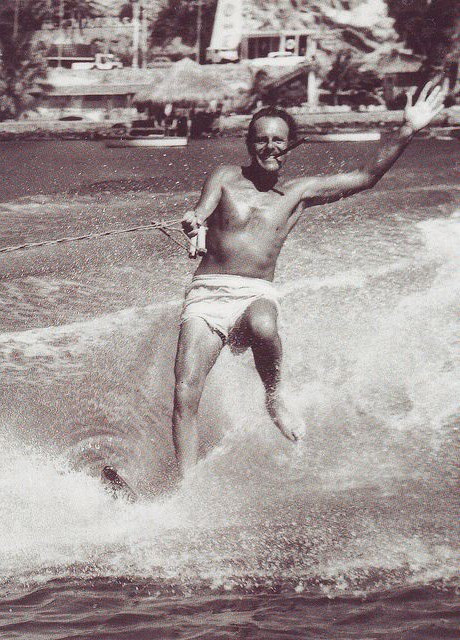
'There was something about Ibiza that encouraged excess while somehow making us feel that we were immune to the consequences,' recalled Susan Elliott. 'I remember Diana Rigg describing a supper party given by Robin Maugham: a glorious sunset, champagne on the terrace; the guests, totally relaxed and uninhibited, exchanging the most bizarre stories of sexual couplings. The chatter was accompanied by yowls from the undergrowth, where two cats were mating. As Diana listened, feline passion seemed to overwhelm the party conversation until all she heard was a piercing shriek. It was, she said, a cry for all Ibiza, a perfect representation of island and people.'
'It was one non-stop party,' agreed T-T's bounderish protégé, Leslie Phillips. 'Everywhere you went were arty people, all the names of the day.' Indeed, so reliable did this region of Ibiza become for supplying snippets from the ongoing celebrity soap opera that several gossip columnists from the English daily tabloids took to turning up there every weekend, knowing that - while having themselves an eminently high old time - they would probably compile enough material to fill the majority of their next half-dozen dispatches.
There were times, inevitably, when the general air of informality encouraged the presence of some uninvited guests, and quite a few 'exclusive' parties witnessed the sudden arrival of a bewildering array of gatecrashers. Terry-Thomas certainly 'had a lot of ding-dongs' because of such brusque intrusions, and on one occasion had to expel no fewer than three-dozen strangers from a supper party he and Belinda were giving for twenty of their friends.
'I didn't hesitate if I saw intruders about to scoff my chicken, paella or apple crumble,' he later declared. 'I marched up to them, asked who they were, why they were there and then ordered them out.' He was particularly suspicious of any 'grubby hippies' who were spotted being mellow in close proximity to his villa, but he was always civil to them so long as they 'smiled benignly' and stayed well away from his private parties. If they looked as though they were contemplating an extended stay at any place nearby, however, he would march down into the local village, seek them out, and 'tear them off a strip'.
He was not even that keen on having his own employees venturing inside his cosy Ibicencan nest. According to Jon Pertwee's wife, Ingeborg, it did not take long for an 'air of gentle neglect' to develop within the villa, because 'Terry could not bear to have servants around him': 'Staff were banished from the house during Terry's waking hours, and the maids had to sneak in at dawn, do the chores and disappear again before he got up. He once told [Jon and me], with real anguish in his voice, that when waking up late one morning he saw his gardener working outside and had told him to go away.' Even in the sunniest of places, it seemed, there was always an 'absolute shower' hanging about nearby, but he was adamant that not one drop, or drip, would be allowed to rain down on his precious retreat.
Avril Angers, his old friend and former colleague from his pioneering days on British TV, was struck when she paid him a visit there of how artfully he tried to maintain his preferred degree of privacy: 'He came and picked me up from the market square and took us along this little track through a forest and up a mountain, and I said, "How do people find their way?" Because there was no road, just a bumpy track. And he said, "Oh, the blue stones". I said, "What do you mean, the blue stones?" And then I looked out of the car, and every now and again on the way there was a stone painted blue - he'd been out there painting them blue so that [his friends] could follow them up to his place!'
Such tactics, combined with the use of Sandy's Bar as a contact point where unexpected callers could be discreetly delayed and 'vetted', usually ensured that he was left in as much peace as he wanted. The clocks had not quite stopped ticking completely, as he would much have preferred, but at least they were ticking slowly enough so as not to intrude on his mood.
As far as T-T was concerned, therefore, even though he continued to feel the odd spasm of homesickness for England, the pros still far outweighed the cons of living in Ibiza. His health, in particular, had certainly improved since he had settled in Santa Eulària: 'All my life I had suffered from bronchial trouble, which had caused me thousands of sleepless, sweat-soaked nights with stomach-churning coughing attacks and a general feeling of doom,' he would recount. 'Once I was in Ibiza I was free of it. Once I got settled in my house, 600 ft up, the condition seemed to leave me and I began sleeping like a baby.'
He was still a dedicated dandy, still an obsessive and pernickety perfectionist ('I don't mind eating off a tray,' he would seek to assure his far more easy-going companions, 'if the tray is perfectly laid and presented'), and still exceptionally fastidious (insisting on - among other things - spotless bed-linen, always keeping two pairs of slippers in use at any one time so as to avoid the risk of 'old dog' smells, and changing his tailor-made underpants no fewer than three times every day). His general outlook on life, however, had also improved since making the move to the Mediterranean.
He still worked (and still needed to work) fairly hard as an actor - there were plenty of movies (including Monte Carlo Or Bust!, 1969; The Abominable Dr Phibes, 1971; and The Vault of Horror, 1973), a BBC sitcom (The Old Campaigner, 1968-9), and numerous TV guests spots and very well-remunerated commercials - but, increasingly, Ibiza felt like reality to him, whereas film sets felt like fiction. It was easier for him to escape from the increasingly shallow and crass show business world and return to his own little Ibizan haven.
He was so much happier and more relaxed now that he was no longer obliged to spend quite so long stuck in the same place as boorish producers, spoilt stars, sycophantic star entourages and uncontrollable would-be agents ('Before every take people were screaming all sorts of things and getting frenetic,' he complained of a recent experience. 'I find that rather unnecessary'), and could bask instead in the 'blissful, exultant aura' of an 'unblemished paradise' that was 'restful if one sought peace and unbelievably lively if one didn't'.
He admitted that he still had 'all sorts of inhibitions', but added that 'I love to see my wife tear her clothes off and go rushing into the sea and not give a damn,' and looked forward to the day when he would pluck up the courage to become a streaker - 'but I would walk'. He certainly felt sufficiently 'with-it' in the late 1960s to follow the likes of John Lennon and have his cream Mercedes Benz 'painted over with hundreds of miniscule terracotta, green, brown and yellow flowers to match my favourite Liberty print shirt'.
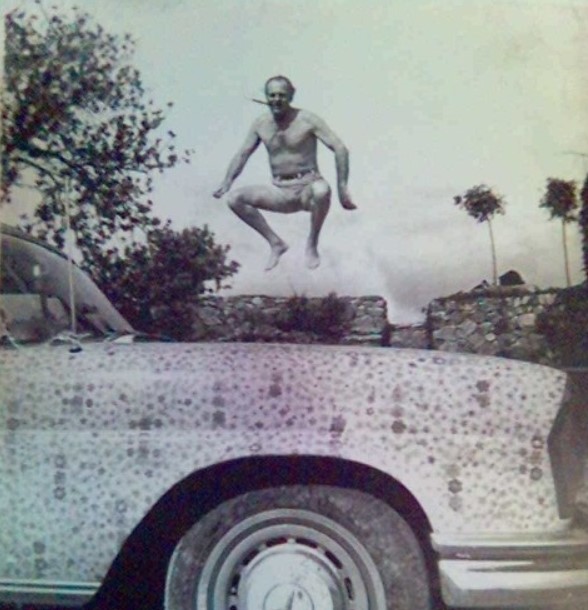
He was most grateful of all for the time that he could now share with Belinda, Tiger and baby Cushan inside a home he regarded proudly as not so much a 'dream-house' as a 'dream-palace'. There would be plenty of days ahead filled with carefree games of tennis, billiards and ping-pong, countless swims in the nearby cove, occasional drives and rides through the countryside and many long and lazy sessions together topping-up their tans under the hazy sun. He was now having fun with his family, instead of just having fun on his own, and he loved every moment of it.
He was well and truly settled, and knew exactly how to make the most of each break from his busy routine. His two boys were growing up - both of them would soon be pupils, along with Jon Pertwee's son Sean, at the island's egregiously relaxed Morna Valley School, which was run by three young guitar-strumming teachers bedecked in colourful kaftans and beads - and he was enjoying watching their respective personalities evolve.
He was also keeping himself fit, in his own inimitable way, by water-skiing up and down the coast while listening to the BBC's Test Match Special on a mini-radio he had attached to one of his ears with a tight little coil of insulating tape. On one particularly bold occasion, he even attempted to ski across the English Channel, and managed to stay 'at it' for almost three hours before he became bored (at which point he flagged down the speedboat and popped in for a drink at a friend's house he had spotted on the coast near Dover).
T-T's Ibizan idyll only ended in the 1980s, when the expense of combatting the increasingly cruel effects of Parkinson's disease (with which he had been diagnosed in the early 1970s) had drained his finances to such an extent that he and his family were forced to move back to England and into a small unfurnished flat in Barnes. The sudden contrast could not have been starker.
Once the sad news of his tragic circumstances began to circulate, many of his old friends and admirers, led by the writer and broadcaster Richard Hope-Hawkins and the actor Jack Douglas, came together to help him. They organised in his honour one of the biggest benefit nights London had ever seen, raising almost £100,000 - half of which went to the Parkinson's Disease Society, while the other half was sufficient for T-T to spend his final days in comparative comfort at a nursing home in Surrey.
He died on 8th January 1990, aged seventy-eight. The many tributes that followed celebrated him as one of Britain's most accomplished comic actors, one of its most distinctive stars, and one of its most charming, endearing and effective of cultural exports.
A trace of T-T, however, still remains in Ibiza. Can Talaias, his old home, is now run as a luxury six-bedroom boutique hotel by his youngest son Cushan, and his wife Laetitia. You can visit there and even stay in the 'Terry-Thomas Suite', a large circular room on the first floor, sit out on the terrace and stare at the sea, and reflect on the place where this most individual and ebullient of comic performers, who gave so much pleasure to so many people, spent the happiest times of his life.
Help us publish more great content by becoming a BCG Supporter. You'll be backing our mission to champion, celebrate and promote British comedy in all its forms: past, present and future.
We understand times are tough, but if you believe in the power of laughter we'd be honoured to have you join us. Advertising doesn't cover our costs, so every single donation matters and is put to good use. Thank you.
Love comedy? Find out moreTerry-Thomas Collection - Comic Icons

Collection of six films featuring British comedy actor Terry-Thomas.
In Private's Progress (1956), upper-class twit Windrush (Ian Carmichael) causes military mayhem when he joins up in the army. An inept soldier, he unwittingly becomes involved in his high-ranking uncle's (Dennis Price) scam to appropriate some rather valuable spoils of war - a haul of German jewels.
The Boulting Brothers comedy Brothers In Law (1957) stars a host of British stars. Roger Thursby (Ian Carmichael) is an overly keen, newly-qualified barrister who rubs his fellow barristers up the wrong way. When he is thrown in at the deep-end, with a particularly hot-tempered judge (Miles Malleson) and tricky case, Thursby learns how to prove himself not only to the judge and fellow barristers but also to the public gallery.
In The Naked Truth (1957), Nigel Dennis (Dennis Price) is an unscrupulous tabloid publisher who is making himself rich by approaching celebrated personages with scandalous stories and offering not to print them for a certain fee. But some of his targets have had enough of this and are drawing up plans to do away with the rotten fellow. Terry-Thomas plays the aristocratic Lord Mayley, while Shirley Eaton plays model Melissa Right, and Peter Sellers is TV star Sonny McGregor.
In Too Many Crooks (1959), Fingers (George Cole) and his gang of crooks seem to be having a run of bad luck, as they keep botching one job after another. When they try to rob the wealthy philanderer Billy Gordon (Terry-Thomas) they manage to get things wrong once again and end up kidnapping his wife Lucy (Brenda Da Banzie) instead. Unfortunately, Billy is overjoyed to have his wife gone and makes no effort to pay the ransom, which makes Lucy mad and absolutely determined to have her revenge.
In School For Scoundrels (1960), Henry Palfrey (Ian Carmichael) is one of life's losers. Despised and disregarded at work, his prospective girlfriend April (Janette Scott) is whisked from under his nose by charming bounder Raymond Delauney (Terry-Thomas). In desperation, Henry enrols at Stephen Potter's (Alastair Sim) College of Lifemanship, where he gradually learns how to get one up on the other fellow.
Make Mine Mink (1960) is based on the stage play by Peter Coke. When Dame Beatrice Appleby (Athene Seyler) receives a fur coat from her ex-jailbird maid Lily (Billie Whitelaw) she can't help but suspect that it was stolen. In order to set things right she gathers together a team of local misfits, headed by the eccentric Major Rayne (Terry-Thomas), and draws up plans for a reverse-heist which will secretly put the mink back into the hands of its rightful owners. However, when the gang set out on their mission, they soon begin thinking that their talents could be put to other uses.
First released: Monday 14th May 2007
- Distributor: Optimum Home Entertainment
- Discs: 6
- Minutes: 545
![]() Buy and sell old and new items
Buy and sell old and new items
Search for this product on eBay
BCG may earn commission on sales generated through the links above.
Bounder!: The Biography Of Terry-Thomas

With his sly little moustache, broad gap-toothed grin, garish waistcoats and ostentatious cigarette holder, Terry-Thomas was known as an absolute bounder, both on-screen and off. Graham McCann's hugely entertaining biography celebrates the life and career of a very English rascal.
Born in 1911 into an ordinary suburban family, Thomas Terry Hoar-Stevens set about transforming himself at a very early age into a dandy and a gadabout. But he did not put the finishing touches to his persona until the mid-1950s with his groundbreaking TV comedy series How Do You View?, a forerunner of The Goon Show and Monty Python's Flying Circus.
Terry-Thomas went on to carve out a long and lucrative career in America, appearing on TV alongside Judy Garland, Bing Crosby and Lucille Ball, and in Hollywood movies with Jack Lemmon, Rock Hudson and Doris Day. He became every American's idea of a mischievous English gent.
After a long battle with Parkinson's disease, he died in 1990 in comparative obscurity, but his influence lives on. Basil Brush was a polyester tribute to Terry-Thomas, and comedians including Vic Reeves and Paul Whitehouse hail T-T as a role model.
"Dandyism is the product of a bored society," D'Aurevilly observed. Terry-Thomas cocked a snook at the dull sobriety of post-war Britain with his sly humour. As he would say himself: "Good show!"
First published: Monday 1st September 2008
- Published: Friday 25th September 2009
- Publisher: Aurum Press
- Pages: 320
- Catalogue: 9781845134419
![]() Buy and sell old and new items
Buy and sell old and new items
Search for this product on eBay
BCG may earn commission on sales generated through the links above.
- Published: Friday 25th September 2009
- Publisher: Aurum Press
- Download: 0.66mb
- Catalogue: 9781845137564
BCG may earn commission on sales generated through the links above.
- Publisher: Aurum Press
- Pages: 320
- Catalogue: 9781845133184
![]() Buy and sell old and new items
Buy and sell old and new items
Search for this product on eBay
BCG may earn commission on sales generated through the links above.
Monte Carlo Or Bust!

An international car rally across Europe is complicated by smuggling, cheating, love at first sight.
- Distributor: Paramount Pictures
- Minutes: 124
BCG may earn commission on sales generated through the links above.
The Abominable Dr. Phibes

Nine killed her, nine shall die, nine eternities in doom!
Horror legend Vincent Price (The Fall Of The House Of Usher, Theatre Of Blood) is Dr. Phibes, former musician, current murderer. Seeking revenge from the medical staff that left his wife for dead, he sets about knocking them off one-by-one in a series of elaborate murders based upon a Ten Plagues of Egypt. Death by bats, by boils, by blood and more await the nurse and surgeons who failed to save the life of the beloved Victoria Regina Phibes!
A camp classic, The Abominable Dr. Phibes sets itself apart from the seventies horror crowd with its knowing humour and art deco sets, and also prefigures the Saw movies with its increasingly fiendish set of murder devices.
Presented in a new high definition transfer from original film elements by MGM.
First released: Monday 10th November 2014
- Distributor: Arrow Books
- Region: B
- Discs: 1
- Minutes: 94
- Subtitles: English
![]() Buy and sell old and new items
Buy and sell old and new items
Search for this product on eBay
BCG may earn commission on sales generated through the links above.
Terry-Thomas - Strictly T-T

A collection of comic songs and sketches, performed by Terry-Thomas across 12 tracks.
First released: Friday 18th January 2019
- Download: 37mb
BCG may earn commission on sales generated through the links above.
- Distributor: London Records
- Catalogue: LL3292
![]() Buy and sell old and new items
Buy and sell old and new items
Search for this product on eBay
BCG may earn commission on sales generated through the links above.

